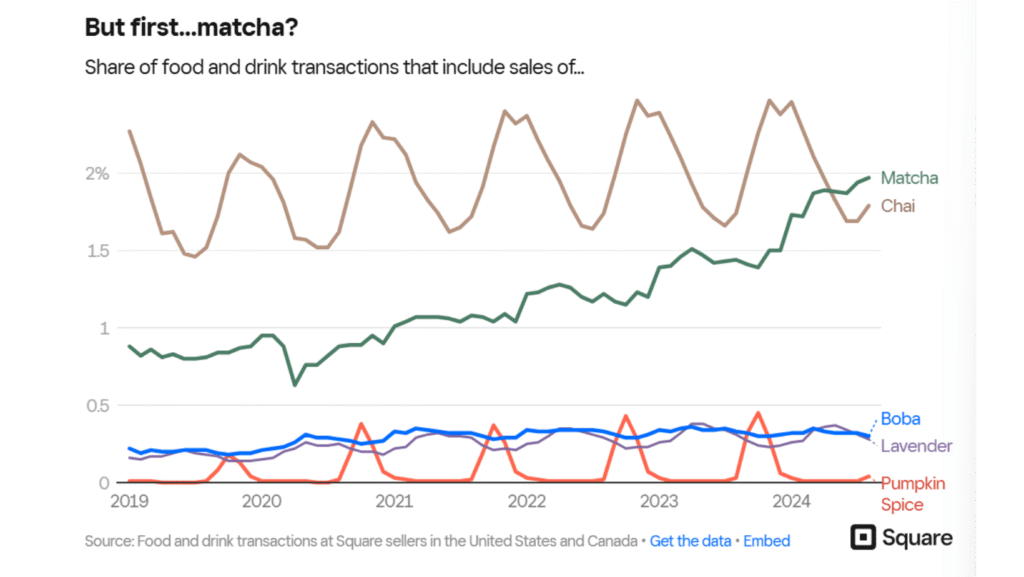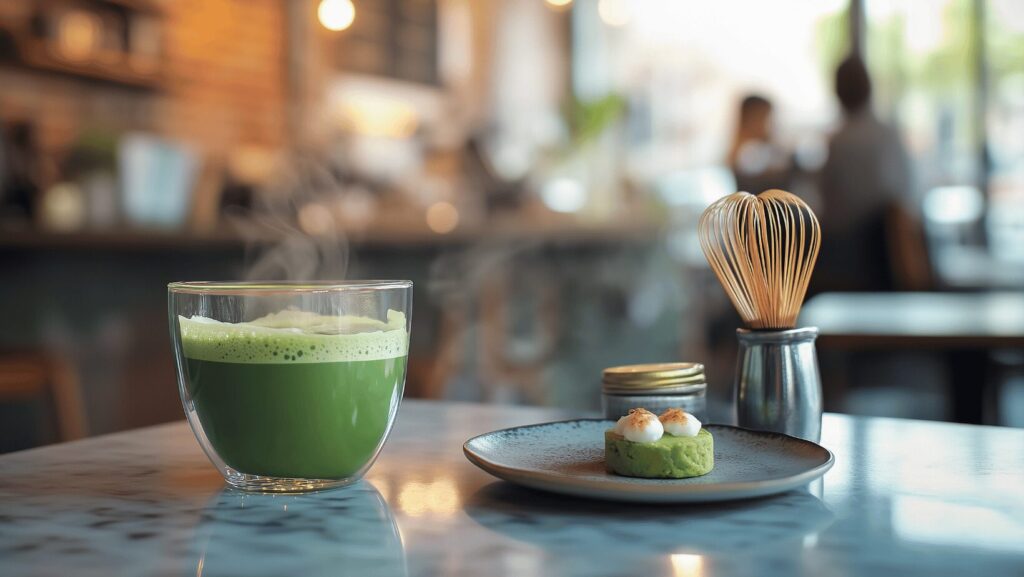Matcha is everywhere.
There are matcha recipes on TikTok, pre-made matcha at the grocery store…
And, more recently, there’s matcha at coffee shops, too.
Over the past six years, coffee shop matcha has become a consumer favorite, with sales numbers double what they were in 2019. In fact, matcha growth has even been steadier than its seasonal counterparts, pumpkin spice and chai lattes.
But does every coffee shop need matcha on the menu? Should your coffee shop have it?
In this blog, we’re diving into all things coffee shop matcha, from what the big players are doing and challenges you need to consider, to the real answer about whether your coffee shop should sell matcha.

What the big players are doing with coffee shop matcha
If the world’s matcha obsession wasn’t enough to convince you that matcha is “in” right now, just look to the biggest coffee shop chains in the world.
Coffee shop chains like Starbucks, Dunkin’, and Dutch Bros have all added matcha to their menus — and there are no signs they’ll be slowing down anytime soon.
Starbucks
When people think of coffee shop matcha, Starbucks is definitely top of the list. They have a great balance of classic and creative, which means there’s a Starbucks matcha for everyone.
Matcha drinks & prices*
- Matcha Latte — $5.35
- Iced Matcha Latte — $5.65
- Iced Lavender Cream Oatmilk Matcha — $5.95
- Matcha Crème Frappuccino® Blended Beverage — $5.95
- Strawberry Matcha Strato™ Frappuccino® Blended Beverage — $5.95
*All prices are for a grande/medium with no additions/substitutions, in USD.
Dunkin’
Dunkin’ might have the fewest offerings on the coffee shop matcha list, but that doesn’t mean they’re not well-loved. They’ve got all of the matcha classics at Dunkin’s crowd-favorite prices.
Matcha drinks & prices*
- Matcha Latte — $5.39
- Iced Matcha Latte — $3.79
- Frozen Matcha Latte — $4.29
*All prices are for a grande/medium with no additions/substitutions, in USD.
Dutch Bros
Dutch Bros definitely has the most creative coffee shop matcha menu, like lavender and white chocolate matcha lattes, and passion fruit and watermelon matcha lemonades.
Matcha drinks & prices*
- Matcha Lattes — $3.25 each
- Matcha Latte flavors: Lavender, Peach, Raspberry, Vanilla, White Chocolate
- Matcha Lemonades — $3.25 each
- Matcha Lemonade flavors: Lavender, Passion Fruit, Peach, Strawberry, Watermelon
*All prices are for a grande/medium with no additions/substitutions, in USD.
Peet’s Coffee
Peet’s has a ton of really unique matcha offerings you won’t see on other coffee shop menus, like coconut water matcha, sparkling matcha, and even a matcha latte with protein!
Matcha drinks & prices*
- Matcha Latte — $5.80
- Iced Matcha Latte — $5.80
- Matcha Latte with Protein — $6.80
- Iced Matcha Latte with Protein — $6.80
- Coconut Water Matcha — $5.95
- Sparkling Peach Matcha — $6.00
- Matcha Frappé — $6.45
*All prices are for a grande/medium with no additions/substitutions, in USD.
The challenges of selling coffee shop matcha
Selling matcha at your coffee shop can be a great idea, but there are challenges you need to consider before going all in. Here are the three biggest challenges of starting up coffee shop matcha.
1 — Matcha can be tricky to integrate into your coffee shop’s existing workflow
If you’ve ever made matcha before (or watched it be made by someone else), then you know it’s a very specialized process. To follow traditional matcha-making methods, you need a bamboo whisk and bowl, you need to hand-whisk it, and you need to make it to order — every time.
So, what’s the solution?
That depends on how committed you are to making ceremonial-grade matcha.
If you want to keep your coffee shop’s matcha as authentic as possible, then there’s no real workaround to the process. You’ll need to find a way to integrate the matcha-making process into your existing workflow in the most productive way possible.
If you’re okay with your coffee shop’s matcha being non ceremonial-grade, then your options open up a lot more.
“My old shop sells a sweetened oat milk matcha that we make in big batches at a time and then sits in a “commercial beverage dispenser” that has a little thing that keeps the batch continuously mixing,” explains one barista on Reddit. “People EAT IT UP and it sells for like $8.”
Another barista said their shop exclusively offered pre-made, which was good for speed but limited availability for those wanting a more authentic matcha experience.
“[My coffee shop] would batch out [matcha], water, and simple syrup into a squirt bottle and use 1-2oz of the pre-made syrup for drinks,” they explained. “[It] helped with work flow, but if someone wanted freshly whisked, we didn’t really have that on offer.”
2 — High-quality matcha can be expensive and difficult for coffee shops to source
When it comes to figuring out how to sell matcha at your coffee shop, one of the biggest hurdles is matcha quality.
According to matcha company UJIDO, there are two main grades of matcha: ceremonial grade and culinary grade.
Ceremonial-grade matcha is the top-shelf stuff. It’s the highest-quality you can get, and it’s only meant to be used for drinking (which makes it very expensive).
Culinary-grade matcha is less luxurious than ceremonial-grade and a lot cheaper. It can be used for drinks, cooking, and baking.
For some baristas, culinary-grade matcha is all a coffee shop needs.
“[We use culinary] grade matcha blended with filtered water and kept in squeeze bottles,” explained one barista on Reddit. “Matcha Lemonade got a dedicated button in the POS over the summer it was so popular.”
For others, ceremonial is the only option.
“I had our cafe bring [matcha] on the menu, [and as] a matcha drinker, it was important to me [we were] using ceremonial grade,” said another barista on Reddit.
And for others still, they’re not quite convinced there’s actually a difference.
Ultimately, the matcha you decide to sell at your coffee shop (or whether you sell matcha at all) can only be determined by you, your business model, and your profit calculations — not what everyone else says is a “must” or “must not.”
Pro tip → Check out our blog on Menu Engineering for tips and tricks on testing if matcha will work at your coffee shop!
3 — Finding your coffee shop’s go-to matcha recipe takes time, patience, and money
Another challenge of selling matcha is figuring out (and mastering) your perfect recipe.
Ceremonial grade or culinary grade? What’s the ideal matcha-to-water ratio? Sweetened with honey or agave? Maybe not sweetened at all? What kind of milk for the matcha latte?
It can take time, patience, and lots of trial-and-error to figure out what recipe works for you and your customers.
And, while there might not be any real shortcuts to this step, we do have a solution to can make things easier:
Keep it as simple as possible
Consensus among matcha-making baristas seems to be that the simpler you keep your base offering, the better.
“I’d also use an unsweetened matcha so that customers can pick and choose,” said one barista on Reddit. “We often get customers [who] will order a regular matcha with no syrup but we will also get plenty of people ordering our matcha with vanilla, lavender, or simple syrup. [I] think they enjoy that freedom of customization.”
Another barista who helped create their coffee shop’s matcha blend suggested that true matcha-lovers will want something simple and straightforward.
“[Coming] up with a good recipe [is] important. As a matcha drinker, it was important to me [our matcha] was using ceremonial grade and strong enough. It was also important to me that if it was sweetened, it would be something like honey or maple syrup and very light. [The] main idea [should be] highlighting real matcha for what it is and not some really sugary drink.”
Should your coffee shop sell matcha?
So, it’s time to answer the question you came here for:
Should you sell matcha at your coffee shop?
Like many things in the coffee shop and cafe industry, the answer is “it depends.”
It’s no secret that matcha is a high-demand menu item right now, and it can be a high-profit item for your coffee shop.
But the reality of adding matcha to your coffee shop’s menu is that it will take some effort.
You’ll need to find ways to fit it into your existing operations, from adding it to your existing workflows to evaluating whether sourcing matcha consistently is a realistic option.
At the end of the day, coffee shop matcha is a hugely popular option among consumers worldwide with tons of potential for your business — but only you can decide if it makes sense for you.




